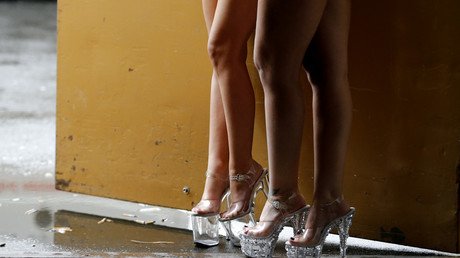Ukrainian MPs want to make Nazi collaborator Bandera a national hero again
Lawmakers from Ukraine's two biggest parties have filed a motion asking the Ukrainian president to posthumously bestow the ‘Hero of Ukraine’ award upon nationalist leader Stepan Bandera, a known Nazi collaborator.
MPs from Ukrainian President Petro Poroshenko's "Solidarity" block together with the right-wing People's Front party have backed a draft resolution asking him to award Bandera, the leader of the Organization of Ukrainian Nationalists (OUN), the country's highest state award.
Bandera is a deeply divisive figure in the Ukrainian history but is considered by many to be a hero, despite his violent methods and accusations of condoning an ethnic cleansing of thousands of Poles in what is now western Ukraine.
Before the Nazi invasion of the Soviet Union in June 1941, Bandera's OUN collaborated with the Nazis, declaring an independent nation shortly after enemy troops arrived, on June 30, 1941. The founding document known as "the act of restoration of Ukrainian state"includes explicit pledges to Nazi Germany.
The collaboration between the Nazi occupational regime and Bandera's Ukraine did not last long, and the nationalist leader was soon arrested and imprisoned by the Germans.
The authorities in Kiev, however, prefer to turn a blind eye on the ugly episodes in Bandera's biography, focusing entirely on his glorification.
In the explanatory note to the resolution, the lawmakers noted that Bandera "fought for Ukrainian statehood against the Soviet and German occupation regimes," became an "embodiment and symbol" of the struggle for Ukrainian independence, turning into "one of the main enemies" of both Nazi Germany and the Soviet Union.
The selective historical memory of the Ukrainian authorities has soured relations between Kiev and Warsaw. Polish President Andrzej Duda estimated that the OUN's militant wing, the UPA, carried out a massacre of some 100,000 Poles in 1942-1944, demanding that Ukraine admits it was an ethnic cleansing. Ukraine, however, insists it was a tragic but justified response to the killing of some 5,000 Ukrainians by Polish militias.
This is the second attempt by Kiev to officially make Bandera a national hero. In January 2010, then-President Viktor Yushchenko awarded Bandera with the title, but four months later, the accolade was withdrawn after a court ruling that Yushchenko had violated state law since Bandera was not a citizen of Ukraine.
The lawmakers now argue that the pretext to rescind the order was far-fetched, stressing that modern Ukraine should be regarded as a successor of all the Ukrainian Republics that ever existed.
Nationalist sentiment has been on the rise in Kiev since the 2014 coup that propelled the current government to power. Some 6,500 people across Ukraine marched to commemorate Bandera's birthday on January 1 this year. Dozens of events honoring the Ukrainian nationalist leader were held.
In July, Zhytomyr, a city in northern Ukraine, declared 2019 the year of Stepan Bandera. The controversial character has been made an honorary citizen of dozens of cities in western Ukraine.
In 2015, Poroshenko signed a law honoring the memory of various rebel and guerrilla groups fighting for the Ukrainian independence, including the OUN.
Think your friends would be interested? Share this story!














